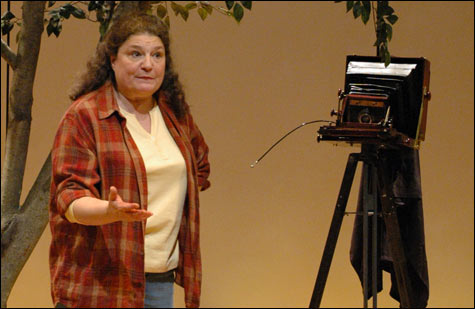
ARTISTIC LICENSE? Sally Mann is portrayed with gentle firmness and frequent bemusement by Anne Scurria. |
Sally Mann doesn’t take photographs, she does Rorschach tests. That’s the case made by Some Things Are Private, the semi-docudrama, semi-fictional-confrontation that’s playing at Trinity Repertory Company in Providence through March 23.
The co-creators are Trinity playwright-in-residence Deborah Salem Smith and director Laura Kepley, who collaborated on the 2006 Boots on the Ground, which dramatized opinions of Rhode Islanders about the Iraq war. That effort gave minimal voice to opposition to the war, in part at least because there isn’t as much dramatic variation packed into a political stance as there is in personal experiences.
Some Things is more or less a fair fight. Those who feel that the photographer exploited her children by posing them nude will see variations on their objections expressed — one of the most compelling things about this play is its acknowledgment that some of Mann’s photographs just plain piss people off. Those who think that art and the First Amendment trump other concerns also get ammunition. And yes, that heart/mind divide seems intended by the creators of this 90-minute essay-in-action.
The focus is on the fuss over Mann’s 1992 collection Immediate Family, which included photographs of her three pre-adolescent children that could be said to sexualize them. The purported offensiveness varied in intensity. The Perfect Tomato, from her subsequent collection, shows daughter Jesse naked in a balletic pose on a picnic table with said fruit. Mann called it “the best damn photo I’ve ever taken.” But then there’s Rodney Plogger at 6:01, in which naked daughter Virginia is held by enormous hands between the legs of a possibly naked man.
Unlike Boots, this Trinity production doesn’t use its own interviews but rather those in the public record, from statements by Mann to letters to newspaper editors. Mann is portrayed with gentle firmness and frequent bemusement by Anne Scurria. Various other voices are dramatized by Janice Duclos, Rachael Warren and Richard Donelly.
Stephen Thorne modulates from perplexed to furiously strident as the invented Thomas Kramer, our surrogate interlocutor. The other characters decide he should be a lawyer, since he’s pushy enough to wrest an audio guide from a fellow museumgoer when he must hear, right then, what Mann has to say about these works. He had come expecting to see her landscapes, one of which his recently deceased wife had purchased. The scene segues into a confrontation with Mann. Kramer is especially upset with Popsicle Drips, which shows dried stains on the torso and genitals of her son.
Kramer fetishizes pictures of his wife as memories made physical; Mann, on the other hand, is aware that her photographs have whatever meanings viewers take from them. “I don’t trust pictures,” she tells Kramer. “You can’t.” Her children romped about naked in the Virginia countryside and she recorded their innocence. She is an artist and answers to inner urgencies she has to trust. If child molesters or dirty-minded prudes assign something else to the pictures, that’s their problem.